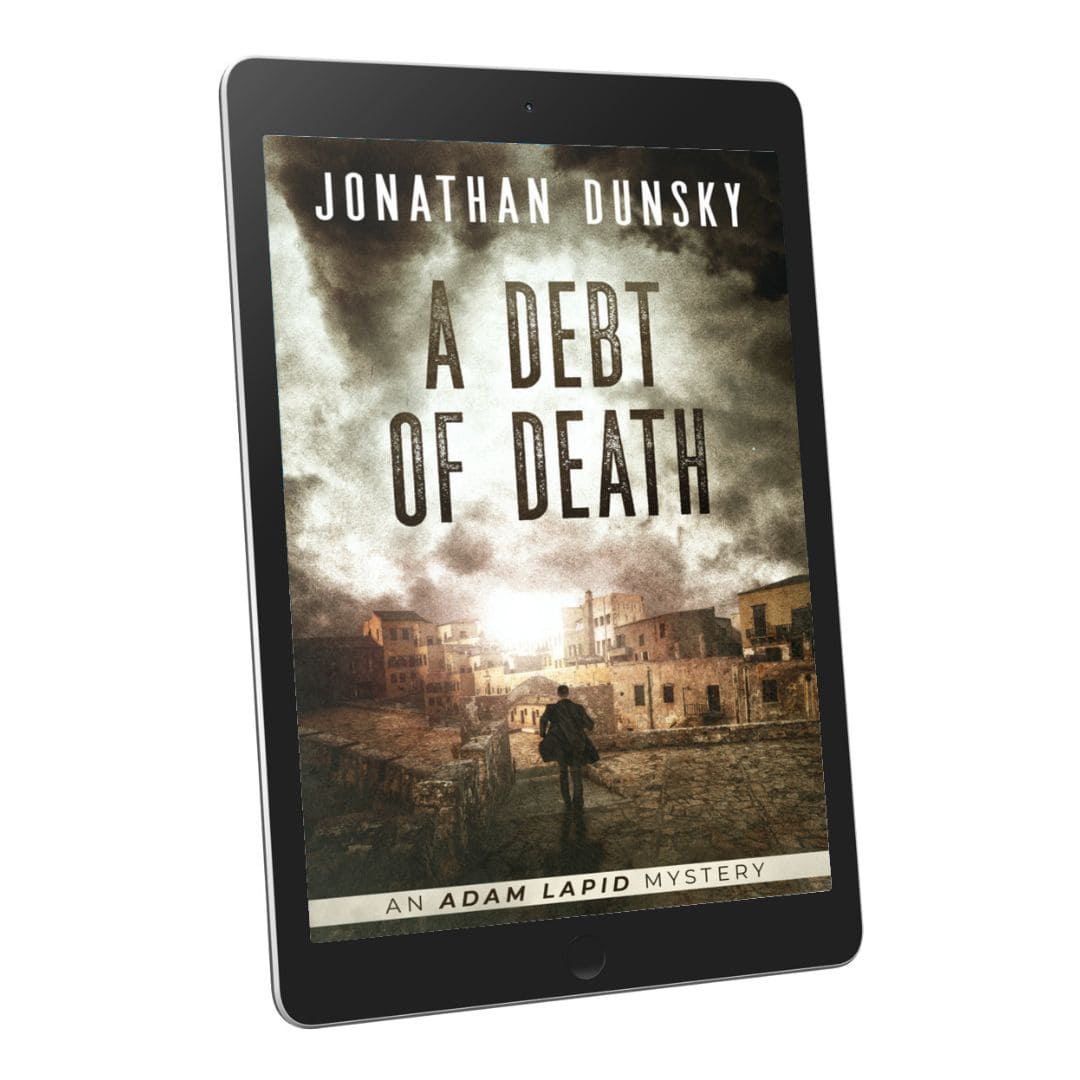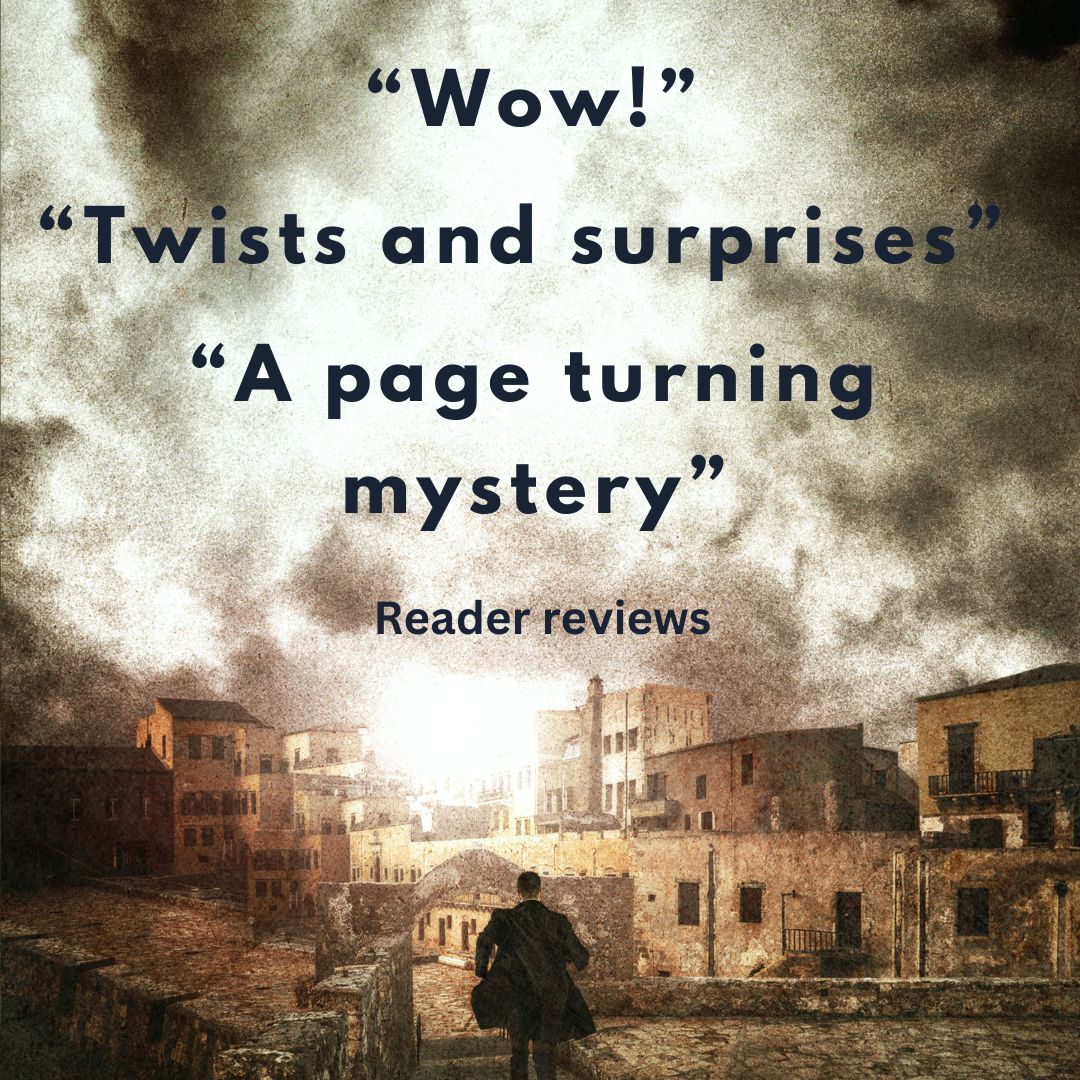Jonathan Dunsky
A Debt of Death (Adam Lapid Mysteries #4) - Ebook
A Debt of Death (Adam Lapid Mysteries #4) - Ebook
Couldn't load pickup availability
- Purchase the E-Book
- Receive Download Link via Email from BookFunnel
- Send to Preferred E-Reader and Enjoy!
Book Description:
Would you risk your life to avenge a murdered friend?
Israel, 1951 - When private detective Adam Lapid finds Nathan Frankel dead in the street, he makes a quick decision:
He'll discover who murdered Nathan and punish the killer himself.
Because Adam owes Nathan a debt that can never be repaid. A debt that goes back to the darkest days of the Second World War.
But Adam's job will not be easy. In fact, it might cost him his life. Because quite a few people had reason to want Nathan dead. And some of them are willing to kill to cover up for their crimes.
This is book #4 in the Adam Lapid series.
Choose from Ebook, Audiobook, or Paperback, Large Print, and Hardcover formats.
Chapter 1 Look Inside
Chapter 1 Look Inside
Chapter 1:
The dead man was lying facedown in a puddle of blood and rainwater.
I didn’t think he was dead at first. My initial impression was that he was a drunk who’d had five or six too many and had stumbled to the curb and passed out. It was the positioning of his body. It didn’t look like dead people often do, with their limbs sticking out at angles that no living soul could tolerate. He looked peaceful, relaxed, like he was in the midst of a deep sleep.
It was only when I crouched down beside him, meaning to nudge him awake and off the wet pavement, that I noticed the blood. I had missed it at first, partly because of the dim lighting afforded by the streetlight five feet away, and partly because the blood had mixed in with the water in the puddle, which had diluted its natural redness to a barely discernible lilac.
I didn’t know it was Nathan Frankel until I turned him over and saw his face.
His eyes were open and, as bad luck would have it, they were staring right at me. I swore, and for some inexplicable reason I had chosen to do so in German. This made me swear again—this time in Hungarian.
His mouth hung slack and open, and there was blood on his lips and chin. His tongue had sunk back toward the rear of his mouth like a rolled-up sock. His face was bleach white, and when I removed my right glove and pressed two fingers against the artery in his neck, the skin felt cold.
There was no pulse. I hadn’t expected to find any. I had seen more dead people than most morticians were likely to lay eyes on over the course of their career. I could tell by his face that Nathan Frankel was quite dead.
I suppose it was groundless hope that led me to check his pulse anyway. And as experience had taught me, when all you have left is groundless hope, you might as well start grieving.
Catching sight of his eyes again, I noticed that they held not the glassy, vacant stare common to the dead, but a mixture of expressions that I could only guess at. Fear, imploration, resignation, accusation?
I muttered another profanity, a particularly juicy Hebrew one I had learned recently and that for some reason had stuck in my mind.
Running my eyes down from Nathan’s face, I noticed the bloodstains on his jacket. It was unbuttoned, and when I drew it open, I saw his drenched shirtfront and the two stab wounds in his torso.
One was on the right side of his stomach, just under the ribs. The other was lower and almost dead center, about where his navel would be. They were bleeder wounds, the sort that wouldn’t kill you fast, but rather would leak out your life drop by drop until you croaked.
Looking around the body, I noticed that there wasn’t as much blood as I would expect there to be. I raised my head, scanning the sidewalk past the body and spotted a trail of red droplets snaking its way north up the pavement. So he had been stabbed somewhere else and had managed to stagger all the way down here.
Was he coming to see me? If so, he had fallen short by about ten meters. I shook my head in anger. Goddammit. Without a conscious thought, I curled my right hand into a fist and brought it down hard on my thigh.
Suddenly I heard a sound behind me. I whipped around, ready to launch myself up from my crouch, fist cocked. But it was only Greta. She stood wide-eyed and slack-jawed, grasping my coat in both hands.
“You left this behind, Adam,” she said in a tremulous voice, her eyes on Nathan’s body. “I saw it and ran out after you…” Her words trailed off and she gulped, closing her mouth with a smack. “Is he…?”
I nodded, lowering and unclenching my fist. “He’s dead.”
“Are you sure?”
“Yes. You better call the police.”
She had installed a telephone in the café two weeks earlier and now went to put it to good use. It was past eleven at night and the air was dry and very cold. I slipped my glove back on. I looked up and down the street, but there was no one in sight. Knowing I had a couple of minutes at most until Greta returned, I squatted by Nathan again, studiously avoiding his eyes, and quickly went through his pockets.
One trouser pocket yielded a ring of keys and a pack of mint chewing gum; the other a cigarette lighter, a near-full pack of Camels, and some change. I put everything back where I’d found it and started working on his jacket.
No gun, no knife, no weapon of any kind. In his right-hand pocket was a ticket stub to a movie at Migdalor Cinema, dated eight days ago. The left-hand pocket was empty. The wallet I found in the inside breast pocket.
I took it out and did a quick search. ID card, which listed an address on Arlozorov Street; ration strip; a receipt from a radio store; what appeared to be an old grocery list written in a tight, cramped scrawl; and a wad of banknotes in the bill compartment. I counted them. Two hundred and thirty-two liras.
I removed two hundred liras, folded them, and stuffed them in my pocket. The thirty-two remaining liras I slipped back into the wallet and then returned it to the pocket from which it came.
I had just about finished doing that when I heard a woman gasp. I turned and there was Greta, looking at me as if she was seeing the real me for the very first time, and what she saw was dirty and immoral and depraved.
“I can explain,” I told her.
She said nothing.
“I did not steal this man’s money, Greta. You need to trust me on this.”
Still she said nothing. I could see the struggle in her face. She desperately wanted to believe I was not a thief, yet her eyes told a different story.
I let out a sigh, got to my feet, took Nathan’s money out of my pocket, and held it out to her.
“There’re two hundred liras here. You keep them for now.” After a slight hesitation, she reached out and plucked the bills from my hand. I bent down, got Nathan’s wallet from his jacket, and counted the remaining banknotes before her eyes. “Thirty-two. All right?”
She nodded slowly, frowning, not sure where I was going with all this, the two hundred liras clasped in her hand.
“You got through to the cops?” I asked after I put the wallet back in its place.
“They’re on their way. The policeman I spoke with said he’d call an ambulance.” She shrugged. “I told him it was no use, but he insisted.”
“That’s all right,” I said. “An ambulance is as good a way as any to haul away a corpse. You okay?”
Greta shuddered. She was still holding my coat in one hand. She thrust it at me. “Here. Put this on. No use catching a cold.”
I smiled in relief. Greta’s maternal instincts were kicking in. It was a good sign. It meant she was on her way to trusting me again. I slid on the coat. “You better head inside and get your own coat. And put the money away before the cops get here.”
She gave me a puzzled look but went inside without comment.
I lit a cigarette and stood puffing away over the corpse of a man whom I had only spoken with for the first time three days ago, but who was in a way as close to me as a brother. From where I was standing, I could no longer see into his dead eyes, but I imagined them still fixed on me. Despite my coat and the warm cigarette smoke in my mouth and lungs, I felt a finger of ice brush along my spine.
Greta emerged from the café and came to stand beside me, now wrapped in a long, gray coat. The coat had a belt looped through it and Greta cinched it tight around her midriff. She hugged herself across her heavy chest.
“Two hundred liras,” she said. “That’s a great deal of money.”
She was right, of course. It was more than what many Israelis earned in six months.
“I wonder how he got it,” she said.
“He was a criminal. That’s how.”
She looked at me. “You know him, Adam?”
I nodded, taking a final drag from my cigarette before dropping it to the pavement and crushing it under my shoe. I stuck my hands in my coat pockets. “His name is Nathan Frankel.”
“How do you know him?”
I was about to answer when a pair of headlights swung into view at the corner of Allenby and Balfour. The police car coasted to a stop, its lights washing over Greta and me before settling on the body. Two men climbed out. The younger one, the driver, was in uniform, while the older one was dressed in civilian clothes. The uniformed cop froze at the sight of the body, shedding about a decade off his early-twenties face, looking like a petrified ten-year-old. The older one noticed and said, “If you’re going to lose your dinner, Elkin, do it on the other side of the car.” He cast a quick glance at Nathan’s corpse, sucked on his lower lip for a second, then turned to Greta and me. “I’m Inspector Leibowitz. You the one who called?”
“Yes,” Greta said.
Leibowitz shifted his gaze to me. “And who might you be?”
I gave him my name and told him I had helped Greta close up the café and that I had been heading home when I came upon the body.
“Did you touch anything, Mr. Lapid?”
“He was lying facedown when I found him. I turned him over and checked his pulse. That’s all.”
I could feel Greta’s eyes on me. I dared not return her gaze. Leibowitz wouldn’t have any reason to assume I was lying, but I knew that his natural suspicion, the weapon of every good detective, was primed and ready. In a murder case it always is. For the moment, Greta and I were the only two people Leibowitz could connect to the body. There was no one he could consider as suspects but the pair of us. I wasn’t about to give him any cause to believe that we were colluding to keep something from him.
“You could have spared yourself the trouble,” he said in a flat tone, fishing a small notebook and pencil from his coat. He checked his wristwatch, flipped open the notebook, and muttered as he wrote, “January 7, 1951. Eleven thirty-four p.m. Allenby Street, Tel Aviv. One male stiff.”
He was a thin man, age forty-three or forty-four, dressed in a black coat and rumpled blue slacks and dark shoes. He stood five seven or eight and had a slightly bent posture. His hair was light brown, with early touches of gray. Beneath the hair was a tall forehead that sloped sharply to a pair of questioning eyebrows that shaded two very dark, slightly bulging eyes. Under the eyes he’d developed bags of the sort that wouldn’t go away even if he slept for twenty-four hours straight. An eagle’s beak of a nose and a wide, unsentimental mouth completed the picture. His was a weary, hard-bitten face that gave the impression that he’d heard all the jokes there were to hear and had judged them unfunny. He reminded me of other cops I’d known, cops who took a dim view of the world and the people who inhabited it, who expected the worst of their fellow man and were suspicious of anything better.
He turned to Constable Elkin. “Get on the radio and tell them to send over a photographer and a corpse wagon.”
“The dispatcher I talked to said he’d call an ambulance,” Greta said.
Leibowitz grunted. “Much good that would do.”
At that moment we saw the harsh lights of the ambulance glide down from the north. It screeched to an abrupt halt before us, and a man wearing a white doctor’s coat and carrying a black bag jumped out.
Leibowitz told him he could put his bag away and asked if they would stick around to take the body to the morgue when the police were done with the scene.
The doctor shook his head resolutely. “No way. That’s not our job.”
Leibowitz didn’t argue. “Fine. You can go.”
“You guys shouldn’t bother us with this sort of thing. We might be needed elsewhere, you know.”
“Yeah, yeah. I’ll make sure to educate the boys at the station. Now get lost, will you?”
The doctor said something under his breath that would have made a lady blush, then got in the ambulance. It swung a U-turn and sped away.
“Goddamn quack,” said Leibowitz.
He stepped closer to the body and did a methodical circuit around it, checking it from all angles. By the tilt of his head, I could tell he had spotted the blood trail leading north. He didn’t follow it. He didn’t have to. The sky had cleared in the evening. There would be no rain that night. The blood would last a while longer.
Constable Elkin leaned out of the police car. “Dispatch said they sent someone to roust Sabban out of bed. He’ll bring his camera along.”
Leibowitz half-smiled. “I’m sure he’ll be thrilled about it. They say how long they’ll be?”
“Ten minutes, fifteen tops.”
Leibowitz nodded and crouched down beside the body, at almost the exact spot where I had done so earlier. He ran his eyes over the corpse, noting aloud for the benefit of Elkin, and maybe for his own as well, the two stab wounds. Then he started poking through Nathan’s pockets. He went through them in just about the same order I had, stopping and rising with the wallet in his hand.
“Nathan Frankel,” he said, holding up the ID card from the wallet. “Twenty-five years of age.” Then, with his back to Greta and me, he took out the money and counted it silently.
“How much is there?” I asked.
Leibowitz stiffened. He jerked his head around to stare at me. A deep frown etched his forehead. It was obvious my question had caught him completely by surprise.
“Why do you ask? You didn’t touch this wallet, did you?”
I shook my head. “Like I told you, I only turned him on his back and checked his neck for a heartbeat. I’m just curious, that’s all.”
He kept on looking at me with that frown on his face for a minute longer, unsure whether or not to believe me. Gradually the frown smoothed itself out, but not completely.
“Twelve liras,” he said, his dark eyes probing my face, trying to read my mind. I would have bet that over the years more than a few suspects had crumbled during interrogation under the pressure of his gaze.
I kept my expression neutral. From the corner of my eye, I could see Greta’s face. It was a good thing Leibowitz was giving me his full attention, because she had a stunned look about her. I sent her a silent message, “Don’t say a word,” and she didn’t. Greta was no fool.
Leibowitz waited for me to speak, almost challenging me to. Like all good investigators, he was familiar with the incredible power of silence. Most people find silence disconcerting and feel compelled to break it by opening their mouth to say something, anything. Often a man might hang himself by revealing things he shouldn’t, just because he finds the silence in the interrogation room unbearable. Of course, Leibowitz was unaware of the fact that I was no stranger to this technique and therefore immune to it. After all, I had once been a police detective myself.
He finally gave up after about a minute. He slipped the wallet into his coat pocket, closing the flap.
“I’ll need your contact information,” he said, all formal now. “Addresses and phone numbers, if you got them.”
Like nearly all Israelis, I did not have a telephone in my apartment and neither did Greta. She gave him the number of the café, and I said I could be reached there most days. Leibowitz jotted the information in his notebook.
What followed were a few minutes of general questioning. I could have guessed the questions before they came out of Leibowitz’s mouth. Hadn’t I asked similar questions on multiple occasions years ago? Only when I’d asked them, I had done so mostly in Hungarian and a couple of times in Romanian.
At precisely what time did I stumble upon the body?
About fifteen minutes before Leibowitz and Elkin came on the scene.
Did Greta or I hear any noise beforehand, like a scuffle or a cry for help? The thud of the body smacking onto the sidewalk?
We shook our heads.
Did we see anyone running by the café’s front window? Or a car streaking past much too fast?
Again, the answer was negative.
When did the last customer before me leave?
Ten o’clock. Greta gave Leibowitz the customer’s name, and he dutifully entered it in his notebook.
Was the deceased a patron of the café?
I let Greta answer no to that question while I held my tongue. A nagging voice in my head informed me in no uncertain terms that I was being a damn fool, that I should tell Leibowitz what I knew about Nathan, that I should let the police do their work, that I had no business or cause to interfere.
I ignored that voice, though I recognized its wisdom. For this murder was my business, and I had every intention of interfering.
When he was done with his questions, Leibowitz told us we were free to leave, though he stressed that he might wish to speak to us again later on. I could feel his eyes on my back as Greta and I retreated to the café.
--- End of Chapter 1 ---
How Do I Get My Book?
How Do I Get My Book?
After you order your ebook, you will get a download link by email.
You can read your ebook on any enabled device, including Kindle, Nook, Kobo, and on modern tablets and smartphones.
The Ebook is delivered by BookFunnel.
Editorial Reviews
Editorial Reviews
"If you only read one P.I. series, make it the addictive, evocative Adam Lapid Mysteries." - Ellen Byron, bestselling mystery author of the Cajon Country Mysteries
"Jonathan Dunsky's Adam Lapid detective series is full of twists and turns, dark secrets, and thrilling suspense--all set against the backdrop of the end of WWII." - Jewish Book Council
"Jonathan Dunsky knows how to create an intriguing mystery that keeps the pages turning." - Murray Leighton-Bailey, author of the Ash Carter thrillers.
"A Debt of Death is a thrilling murder mystery set in Israel, 1951." - Leah's Books
"I 'binge-read' the entire series." - Cardinal Bluff Reviews
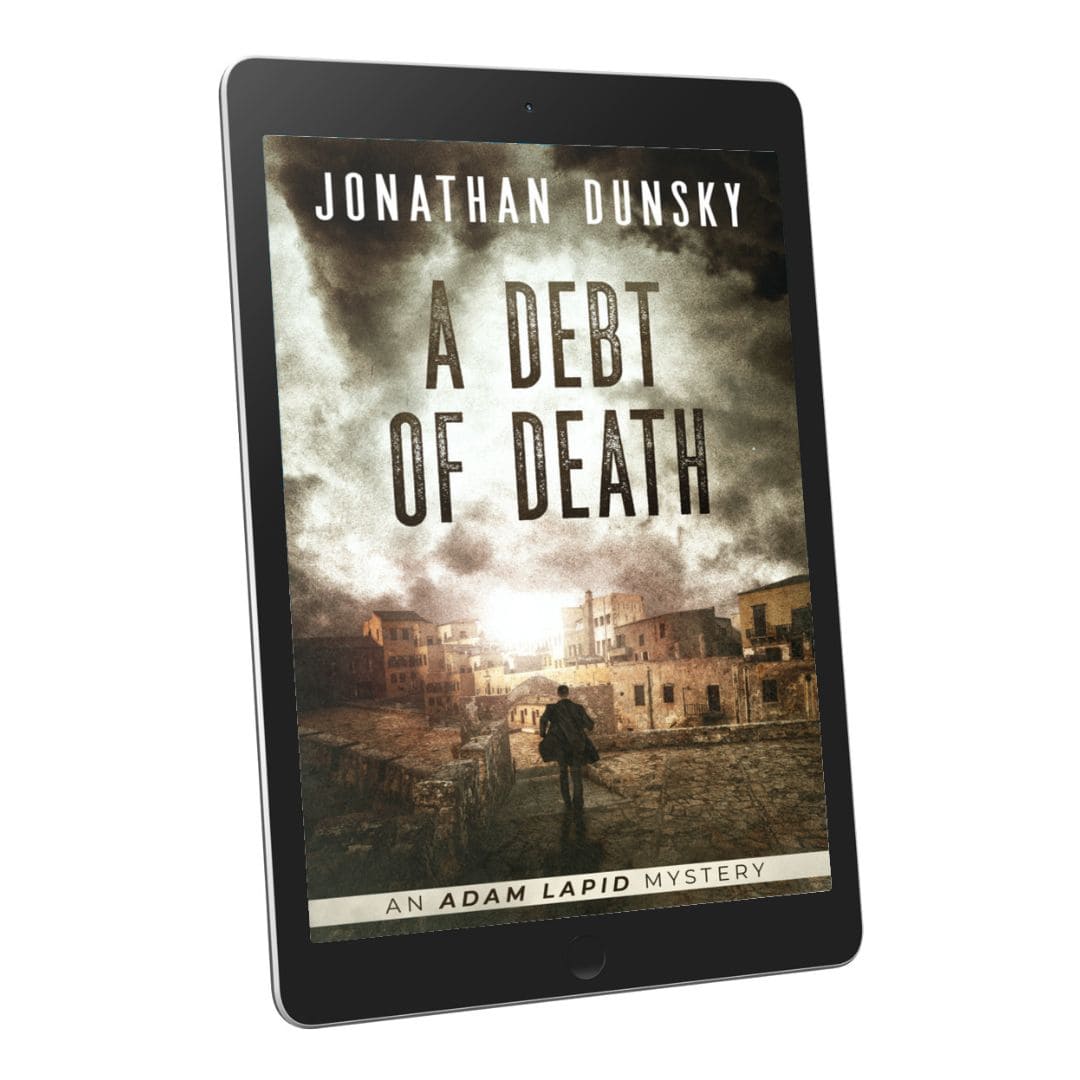
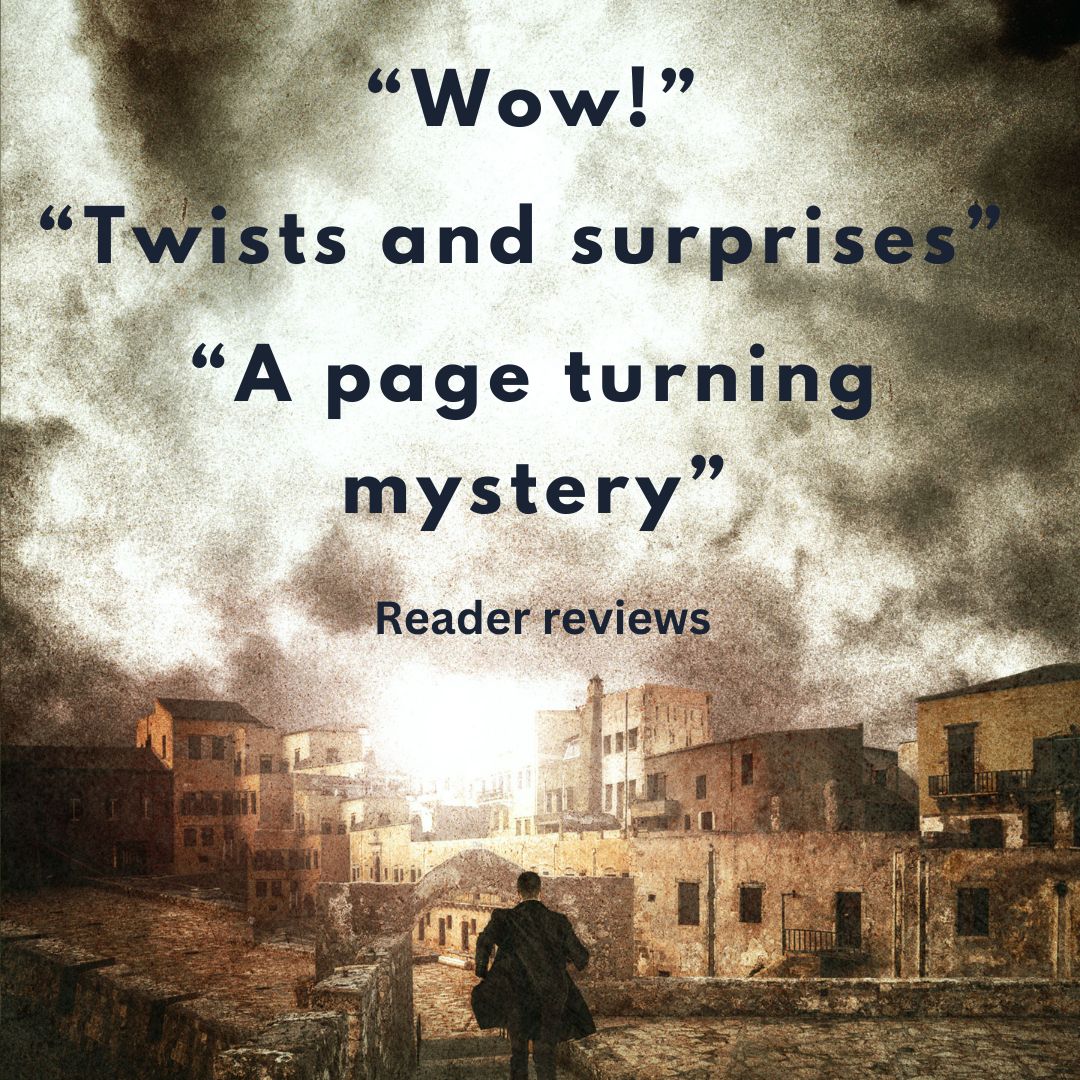

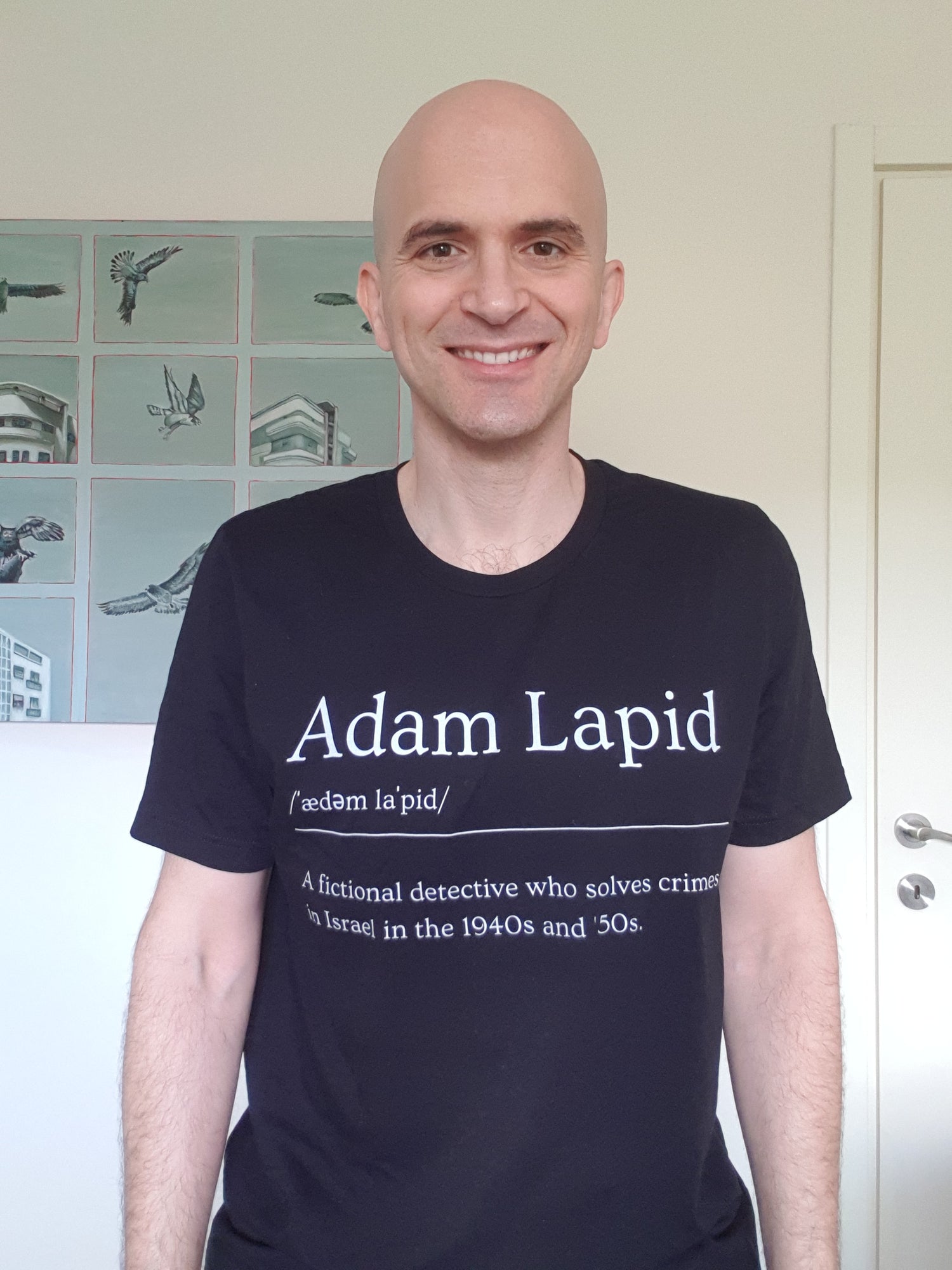
Hi, I'm Jonathan Dunsky
I love history and solving puzzles, so I decided to combine my two passions by writing historical mysteries.
My main body of work is the Adam Lapid series. The Adam Lapid novels are historical mysteries that take place in Israel in the 1940s and '50s.
The one exception is The Auschwitz Detective, a book that takes place in Auschwitz in 1944.
I hope you'll join Adam Lapid as he hunts for crafty killers on the dusty streets of Israel and war-torn Europe.
You can get books 1-8 in the series for 20% off here: 8 Books Bundle.
I have read all of your books. They were excellent. I really enjoyed the story lines of each book. I hope there will be more books.
I've bought all this series for my mom she love the way they are written
Wonderful detective novels, I am starting to read slower so to enjoy the books longer! GO ADAM LAPID! And thank you Johnathan!
We’re on our 9th Adam LaPid audiobook. My husband & I enjoy walking and listening to your books every day! Purchasing was simple, quick & direct. Our favorite, The Auschwitz Detective. The description of the horrors endured by the people held in the camps was so heartbreaking. It really provided an insight into what actually occurred in these “ killing” camps! But we’ve also learned a lot about the history of Israel and the ongoing struggles of the Jewish people.
This was so far the best! I couldn't put it down. A lot of twists and turns that kept me trying to figure it all out. Even then, I was surprised at the end.
